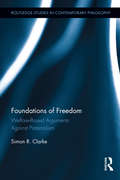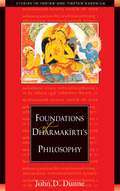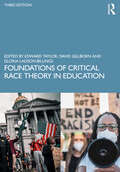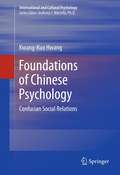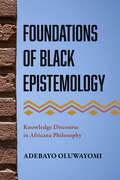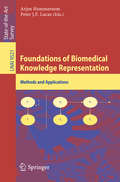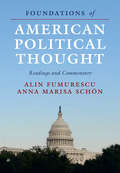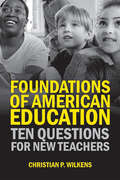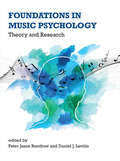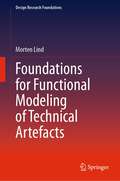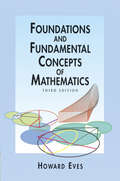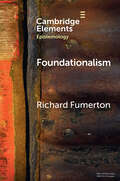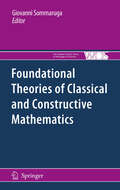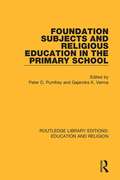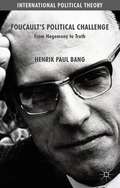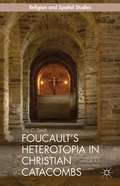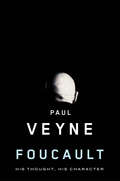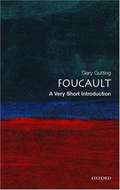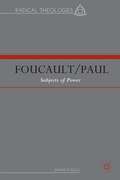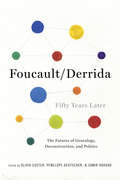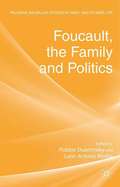- Table View
- List View
Foundations of Freedom: Welfare-Based Arguments Against Paternalism (Routledge Studies in Contemporary Philosophy)
by Simon R. ClarkeWhat makes individual freedom valuable? People have always believed in freedom, have sought it, and have sometimes fought and died for it. The belief that it is something to be valued is widespread. But does this belief have a rational foundation? This book examines answers to these questions that are based on the welfare of the person whose freedom is at stake. There are various conceptions of a worthwhile life, a life that is valuable for the person whose life it is. These conceptions will be examined to see whether they are plausible and what their connection, if any, is to freedom. Are they compelling foundations for freedom? Does freedom make a person’s life better or would his/her welfare be advanced by restricting freedom?
Foundations of Dharmakirti's Philosophy
by John D. DunneThroughout the history of Buddhism, few philosophers have attained the stature of Dharmakirti, the "Lord of Reason" who has influenced virtually every systematic Buddhist thinker since his time. Dharmakirti's renowned works, written in India during the philosophically rich seventh century, argue that the true test of knowledge is its efficacy, and likewise that only the efficacious is knowable and real. Around this central theme is woven an intricate web of interrelated theories concerning perception, reason, language, and the justification of knowledge. Masterfully unpacking these foundations of Dharmakirti's system, John Dunne presents the first major study of the most vexing issues in Dharmakirti's thought within its Indian philosophical context. Lucid and carefully argued, Dunne's work serves both as an introduction to Dharmakirti for students of Buddhism and a groundbreaking resource for scholars of Buddhist thought.
Foundations of Critical Race Theory in Education
by Gloria Ladson-Billings David Gillborn Edward TaylorCritical Race Theory (CRT) is at the forefront of contemporary discussions about racism and race inequity in education and politics internationally. The emergence of CRT marked a pivotal moment in the history of racial politics within the academy and powerfully influenced the broader conversation about race and racism in the United States and beyond. Comprised of articles by some of the most prominent scholars in the field, this groundbreaking anthology is the first to pull together both the foundational writings and more recent scholarship on the cultural and racial politics of schooling. The collection offers a variety of critical perspectives on race, analysing the causes, consequences and manifestations of race, racism and inequity in schooling. Unique to this updated edition is a variety of contributions by key CRT scholars published within the last five years, including an all-new section addressing the war on CRT that followed the murder of George Floyd and international protests in support of #BlackLivesMatter. Each section concludes with a set of questions and discussion points to further engage with the issues discussed in the readings. This revised edition of a landmark publication documents the progress of the CRT movement and acts to further spur developments in education policy, critical pedagogy and social justice, making it a crucial resource for students and educators alike.
Foundations of Constructive Probability Theory (Encyclopedia of Mathematics and its Applications #177)
by Yuen-Kwok ChanUsing Bishop's work on constructive analysis as a framework, this monograph gives a systematic, detailed and general constructive theory of probability theory and stochastic processes. It is the first extended account of this theory: almost all of the constructive existence and continuity theorems that permeate the book are original. It also contains results and methods hitherto unknown in the constructive and nonconstructive settings. The text features logic only in the common sense and, beyond a certain mathematical maturity, requires no prior training in either constructive mathematics or probability theory. It will thus be accessible and of interest, both to probabilists interested in the foundations of their speciality and to constructive mathematicians who wish to see Bishop's theory applied to a particular field.
Foundations of Comparative Politics
by Kenneth Newton Jan W. Van DethThis student-friendly introduction to the key theories and concepts of comparative politics now provides even broader coverage of the world's democracies, with examples drawn from across the globe. Foundations of Comparative Politics contains a wealth of information, clearly structured and easy to read, with clear definition of Key Terms. It covers all the important themes in the field, including constitutional design and institutions; mass and elite politics; policy-making and implementation; and the future of the state and democracy in a globalising world. A new chapter on studying comparative politics, and new 'What Have We Learned?' and 'Lessons of Comparison' summary sections help students pull together the lessons of each chapter. Combining facts and theory throughout, debate is stimulated through the use of Controversy boxes, and Fact Files and Briefings give students interesting data that illustrates the key issues in the text. Online resources, including MCQs and Powerpoint slides, complete the package.
Foundations of Chinese Psychology
by Kwang-Kuo HwangMainstream psychology emanated from European-American and Judeo-Christian philosophical and scientific traditions. The application of this viewpoint, which embeds colonial and imperialist concepts is less relevant to Asian and other indigenous cultures. Although it has been accepted by non-Western scholars in an attempt to emulate Western scientific practice, the mainstream viewpoint is in a process of transformation to accommodate geographically relevant perspectives. In this light, Foundations of Chinese Psychology, bridges the gap between western and eastern traditions and elaborates on theories based on local phenomena, findings, and experiences by research methods that are contextually appropriate. Using a guiding principle of cultural psychology - 'one mind, many mentalities', this book advocates the balancing of a global psychology concept without sacrificing that of a specific locality and people. It analyzes the basics of Confucionism and compares them to Western ethical thinking, arriving at a series of theories concerning social exchange, face, achievement motivation, organizational behaviors, and conflict resolution. Beyond the specifics of a particular culture, this book exemplifies the act of constructing autonomous social science that may be emulated in other non-Western settings. It also serves as an excellent guide for cross-cultural research as well as a caveat on the limitations of presumptive individualism and exclusionary perspectives.
Foundations of Black Epistemology: Knowledge Discourse in Africana Philosophy
by Adebayo OluwayomiFoundations of Black Epistemology is Adebayo Oluwayomi’s bold endeavor to delineate Black epistemology as a new sub-disciplinary focus in contemporary Africana or Black philosophy. He engages in a rigorous historical study of Black intellectual history to show how seminal Black thinkers have long been interested in and engaged with questions concerning the phenomenon of human knowledge, and questions around human agency, including practical considerations regarding the social and political value of knowledge. Foundations of Black Epistemology examines writings by Phillis Wheatley, Frederick Douglas, Ida B. Wells, W.E.B. DuBois, Frantz Fanon, Steve Bantu Biko, Huey P. Newtown, and Kathleen Neal Clever. Each chapter addresses issues of self-knowledge, self-assertion, Black consciousness, or anticolonialism and its relation to personal and political epistemologies. Oluwayomi offers innovative perspectives on the formulation, deduction, and interrogation of epistemological themes within Black Africana philosophy. By considering the important epistemological theories and arguments in Black philosophy particularly in the last 150 to 200 years, Foundations of Black Epistemology promises to generate new discussions around this necessary field of Black Africana philosophy.
Foundations of Biomedical Knowledge Representation
by Arjen Hommersom Peter J.F. LucasMedicineand health care are currently faced with a significant rise in theircomplexity. This is partly due to the progress made during the past threedecades in the fundamental biological understanding of the causes of health anddisease at the molecular, (sub)cellular, and organ level. Since the end of the1970s, when knowledge representation and reasoning in the biomedical fieldbecame a separate area of research, huge progress has been made in thedevelopment of methods and tools that are finally able to impact on the waymedicine is being practiced. Eventhough there are huge differences in the techniques and methods used bybiomedical researchers, there is now an increasing tendency to share researchresults in terms of formal knowledge representation methods, such asontologies, statistical models, network models, and mathematical models. Asthere is an urgent need for health-care professionals to make better decisions,computer-based support using this knowledge is now becoming increasingly important. It may also be the only way to integrate research results from the differentparts of the spectrum of biomedical and clinical research. Theaim of this book is to shed light on developments in knowledge representationat different levels of biomedical application, ranging from human biology toclinical guidelines, and using different techniques, from probability theoryand differential equations to logic. The book starts with two introductorychapters followed by 18 contributions organized in the following topicalsections: diagnosis of disease; monitoring of health and disease andconformance; assessment of health and personalization; prediction and prognosisof health and disease; treatment of disease; and recommendations.
Foundations of American Political Thought: Readings and Commentary
by Alin Fumurescu Anna Marisa SchönAmerican political thought was shaped by a unique combination of theoretical influences: republicanism, liberalism, and covenant theology. This reader shows how these influences came together. Organized chronologically from the Puritans' arrival in the New World to the Civil War, each chapter includes carefully selected primary sources and substantial commentary to explain the historical context and significance of the excerpts. A coherent interpretative framework is offered by focusing the analysis on the different assumptions of the people - the republican understanding as a corporate whole and the liberal understanding as a multitude of individuals - that were intertwined during the founding. The book features, for the first time, two chapters on non-American authors, who capture the main tenets of republicanism and liberalism and were widely quoted in the era, as well as excerpts from lesser-known sources, including Puritan covenants, the first state constitutions, and Native American speeches.
Foundations of American Education: Ten Questions for New Teachers
by Christian P. WilkensAnswers all the questions that students preparing for a career in education ask.Foundations of American Education asks many of the questions new teachers face: How should I handle classroom management? How will I know if students are learning what they should? What should I do in class my first year? How can I make things better for students? This book addresses major topics covered by introductory-level education classes, such as the history of US public schools, curriculum and assessment, classroom management, school governance, law, and more. Each chapter includes stories and examples from real teachers and schools and closes with a major US court case about public education. A major goal for the volume is to develop a sense for what US public school teachers do now and how we might be able to do better in the years ahead.
Foundations in Music Psychology: Theory and Research (The\mit Press Ser.)
by Daniel J. Levitin Peter Jason RentfrowA state-of-the-art overview of the latest theory and research in music psychology, written by leaders in the field.This authoritative, landmark volume offers a comprehensive state-of-the-art overview of the latest theory and research in music perception and cognition. Eminent scholars from a range of disciplines, employing a variety of methodologies, describe important findings from core areas of the field, including music cognition, the neuroscience of music, musical performance, and music therapy. The book can be used as a textbook for courses in music cognition, auditory perception, science of music, psychology of music, philosophy of music, and music therapy, and as a reference for researchers, teachers, and musicians. The book's sections cover music perception; music cognition; music, neurobiology, and evolution; musical training, ability, and performance; and musical experience in everyday life. Chapters treat such topics as pitch, rhythm, and timbre; musical expectancy, musicality, musical disorders, and absolute pitch; brain processes involved in music perception, cross-species studies of music cognition, and music across cultures; improvisation, the assessment of musical ability, and singing; and music and emotions, musical preferences, and music therapy.ContributorsFleur Bouwer, Peter Cariani, Laura K. Cirelli, Annabel J. Cohen, Lola L. Cuddy, Shannon de L'Etoile, Jessica A. Grahn, David M. Greenberg, Bruno Gingras, Henkjan Honing, Lorna S. Jakobson, Ji Chul Kim, Stefan Koelsch, Edward W. Large, Miriam Lense, Daniel Levitin, Charles J. Limb, Psyche Loui, Stephen McAdams, Lucy M. McGarry, Malinda J. McPherson, Andrew J. Oxenham, Caroline Palmer, Aniruddh Patel, Eve-Marie Quintin, Peter Jason Rentfrow, Edward Roth, Frank A. Russo, Rebecca Scheurich, Kai Siedenburg, Avital Sternin, Yanan Sun, William F. Thompson, Renee Timmers, Mark Jude Tramo, Sandra E. Trehub, Michael W. Weiss, Marcel Zentner
Foundations for Functional Modeling of Technical Artefacts (Design Research Foundations)
by Morten LindThis monograph provides a new framework for modelling goals and functions of control systems. It demonstrates how to use means-end concepts and various aspects of action to describe the relations between the structure, dispositions, functions, and goals of technical systems and with human action. The author developed this approach as part of his research on Multilevel Flow Modelling (MFM). He based the framework on concepts of action and means-end analysis drawing on existing theories from several areas of study, including philosophical logic, semiotics, and phenomenological approaches to social science. Here, he applies it to three modeling situations related to the interaction of technical artefacts and humans. One involves the relation between designer and artefact, another the relation between technical artefact and its user, and the third the relation between a natural object and its user. All three are relevant for modelling complex automated processes interacting with human operators. The book also discusses challenges when applying the foundations for modelling of technical artefacts. Overall, it provides a cross disciplinary integration of several fields of knowledge. These disciplines include intelligent process control, human machine interaction, and process and automation design. As a result, researchers and graduate students in computer science, engineering, and philosophy of technology will find it a valuable resource.
Foundations and Fundamental Concepts of Mathematics
by Howard EvesThis third edition of a popular, well-received text offers undergraduates an opportunity to obtain an overview of the historical roots and the evolution of several areas of mathematics.The selection of topics conveys not only their role in this historical development of mathematics but also their value as bases for understanding the changing nature of mathematics. Among the topics covered in this wide-ranging text are: mathematics before Euclid, Euclid's Elements, non-Euclidean geometry, algebraic structure, formal axiomatics, the real numbers system, sets, logic and philosophy and more. The emphasis on axiomatic procedures provides important background for studying and applying more advanced topics, while the inclusion of the historical roots of both algebra and geometry provides essential information for prospective teachers of school mathematics.The readable style and sets of challenging exercises from the popular earlier editions have been continued and extended in the present edition, making this a very welcome and useful version of a classic treatment of the foundations of mathematics. "A truly satisfying book." -- Dr. Bruce E. Meserve, Professor Emeritus, University of Vermont.
Foundationalism (Elements in Epistemology)
by Richard FumertonFoundationalism is a view about the structure of knowledge and justification. The heart of the thesis is the claim that if there is any knowledge or justified belief at all, then there is a kind of knowledge and justified belief that does not require inference from something else known or justifiably believed. This Element begins by exploring abstract arguments for foundationalism and against proposed alternatives. It then explores disagreements among foundationalists about how to understand foundational knowledge and justified belief, what is plausibly included in the foundations, and what is required for legitimate inference from foundations to the rest of what we believe. The author argues for the conclusion that one can combine insights captured by different versions of foundationalism by making a distinction between ideal justification and justification that falls short of that ideal.
Foundational Theories of Classical and Constructive Mathematics
by Giovanni SommarugaThe book "Foundational Theories of Classical and Constructive Mathematics" is a book on the classical topic of foundations of mathematics. Its originality resides mainly in its treating at the same time foundations of classical and foundations of constructive mathematics. This confrontation of two kinds of foundations contributes to answering questions such as: Are foundations/foundational theories of classical mathematics of a different nature compared to those of constructive mathematics? Do they play the same role for the resp. mathematics? Are there connections between the two kinds of foundational theories? etc. The confrontation and comparison is often implicit and sometimes explicit. Its great advantage is to extend the traditional discussion of the foundations of mathematics and to render it at the same time more subtle and more differentiated. Another important aspect of the book is that some of its contributions are of a more philosophical, others of a more technical nature. This double face is emphasized, since foundations of mathematics is an eminent topic in the philosophy of mathematics: hence both sides of this discipline ought to be and are being paid due to.
Foundation Subjects and Religious Education in the Primary School (Routledge Library Editions: Education and Religion #9)
by Gajendra K. Verma Peter D. PumfreyFirst published in 1993. This volume brings together writings of specialists in the key components of both the whole and the basic curriculum. It sets out to describe and discuss cultural diversity and the whole curriculum from a variety of perspectives and to consider how the concerns of ethnic groups may be addressed within the framework of the national curriculum. To this end, specialists in areas of the curriculum consider some of the challenges and describe promising practices in the secondary school. Much remains undecided concerning the structure, content, pedagogy and assessment of many components of the primary-school curriculum. Despite these considerations, the multicultural nature of the population and of schools will develop. These developments and their educational implications must be considered if the educational system is to respond adequately. Although the ‘rules of the curricular game’ are still being negotiated in relation to a number of aspects of the curriculum, the editors have deliberately ventured into this controversial field. They do so because of the increasing importance of ethnic diversity of the school population and of the country.
Foundation Myths and Politics in Ancient Ionia
by Naoíse Mac SweeneyThis book examines foundation myths told about the Ionian cities during the archaic and classical periods. It uses these myths to explore the complex and changing ways in which civic identity was constructed in Ionia, relating this to the wider discourses about ethnicity and cultural difference that were current in the Greek world at this time. The Ionian cities seem to have rejected oppositional models of cultural difference which set in contrast East and West, Europe and Asia, Greek and Barbarian, opting instead for a more fluid and nuanced perspective on ethnic and cultural distinctions. The conclusions of this book have far-reaching implications for our understanding of Ionia, but also challenge current models of Greek ethnicity and identity, suggesting that there was a more diverse conception of Greekness in antiquity than has often been assumed.
Foucault’s Political Challenge
by Henrik Paul BangTracing increasing distrust of politicians and democratic institutions back to the negative idea of political power and freedom as always being a 'power over' and 'freedom from', this text examines Foucault's alternative conception of the politician as one who has the courage to tell people the truth about what has to be done in the face of the dangers they confront. Telling the truth is not sufficient, but must be complemented with empowering people to actively help in overcoming the dangers themselves. Breaking with conceptions of politics as hierarchy and anarchy, Foucault contended that where there is obedience, there cannot be truth and genuine freedom. This book offers a redefinition of power and freedom within a circular logic of true authority and self-governance. It argues that democracy cannot survive without being innovated along these lines, and considers what can be done to reconnect politicians and laypeople in order to rebuild their mutual trust in each other's political capacities.
Foucault’s Heterotopia in Christian Catacombs
by Eric C. SmithRinging the city like pearls on a necklace and plunging beneath the earth into darkness, the Christian catacombs of Rome have inspired and captivated people for centuries. This book takes a new approach to the study of the catacombs, using spatial theory to understand the way the catacombs were constructed, decorated, and used. Relying on the theoretical work of Michel Foucault and Henri Lefebvre, this book moves beyond traditional forms of analysis to turn a new lens to the work of understanding these monuments of early Christianity. The location and form of the Callistus Catacomb, the art found inside, the texts referenced in that art, and the community practices performed and referenced deep underground form the heart of this innovative take on the grand burial sites of the early church.
Foucault: His Thought, His Character
by Paul VeyneMichel Foucault and Paul Veyne: the philosopher and the historian. Two major figures in the world of ideas, resisting all attempts at categorization. Two timeless thinkers who have long walked and fought together. In this short book Paul Veyne offers a fresh portrait of his friend and relaunches the debate about his ideas and legacy. 'Foucault is not who you think he is', writes Veyne; he stood neither on the left nor on the right and was frequently disowned by both. He was not so much a structuralist as a sceptic, an empiricist disciple of Montaigne, who never ceased in his work to reflect on 'truth games', on singular, constructed truths that belonged to their own time. A unique testimony by a scholar who knew Foucault well, this book succeeds brilliantly in grasping the core of his thought and in stripping away the confusions and misunderstandings that have so often characterized the interpretation of Foucault and his work.
Foucault: A Very Short Introduction
by Gary GuttingFrom aesthetics to the penal system, and from madness and civilization to avantgarde literature, Foucault was happy to reject old models of thinking and replace them with fresh versions that are still being debated today. A major influence on Queer Theory and gender studies (he was openly gay and died of an AIDS-related illness in 1984), he also wrote on architecture, history, law, medicine, literature, politics, and of course philosophy. He even managed to write a best seller in France on a book dedicated to the history of systems of thought. Because he never succinctly stated his arguments, those trying to come to terms with Foucault's work have desperately sought introductory material to make his theories clear and accessible for the beginner. Here, Gary Gutting presents a comprehensive but non-systematic treatment of some highlights of Foucault's life and thought. The book begins with a brief biography to set the social and political stage. It then moves on to touch on Foucault's thoughts on literature, in particular the avantgarde scene, his philosophical and historical work and the reception he received from the historical community, his treatment of knowledge and power in modern society, and his thoughts on sexuality.
Foucault/paul
by Sophie FuggleWhat is power? Where does it come from and who is in possession of it? How should we think about power and authority in a post-secular society in which traditional boundaries between individual and collective faith and secular governments and institutions are becoming increasingly blurred? The way which we conceive of power in the twenty-first century will effectively determine how we approach issues such as market reform and environmental disaster. Placing the twentieth-century French philosopher Michel Foucault into critical conjunction with the apostle Paul, Foucault/Paul re-evaluates the way in which power operates within society and underpins our ethical and political actions.
Foucault/Derrida Fifty Years Later: The Futures of Genealogy, Deconstruction, and Politics (New Directions in Critical Theory #12)
by Penelope Custer Olivia Deutscher Haddad SamirEarly in their careers, Michel Foucault and Jacques Derrida argued over madness, reason, and history in an exchange that profoundly influenced continental philosophy and critical theory. In this collection, Amy Allen, Geoffrey Bennington, Lynne Huffer, Colin Koopman, Pierre Macherey, Michael Naas, and Judith Revel, among others, trace this exchange in debates over the possibilities of genealogy and deconstruction, immanent and transcendent approaches to philosophy, and the practical and theoretical role of the archive.
Foucault/Derrida Fifty Years Later: The Futures of Genealogy, Deconstruction, and Politics
by Samir Haddad Olivia Custer Penelope DeutscherEarly in their careers, Michel Foucault and Jacques Derrida argued over madness, reason, and history in an exchange that profoundly influenced continental philosophy and critical theory. In this collection, Amy Allen, Geoffrey Bennington, Lynne Huffer, Colin Koopman, Pierre Macherey, Michael Naas, and Judith Revel, among others, trace this exchange in debates over the possibilities of genealogy and deconstruction, immanent and transcendent approaches to philosophy, and the practical and theoretical role of the archive.
Foucault, the Family and Politics
by Robbie Duschinsky Leon Antonio RochaDrawing on the writings of Foucault, this book explores the politics and power-dynamics of family life, examining how everyday obligations such as attending school, going to work and staying healthy are organized through the family. The book includes an essay by Foucault, Les désordres des familles , translated here in English for the first time.
